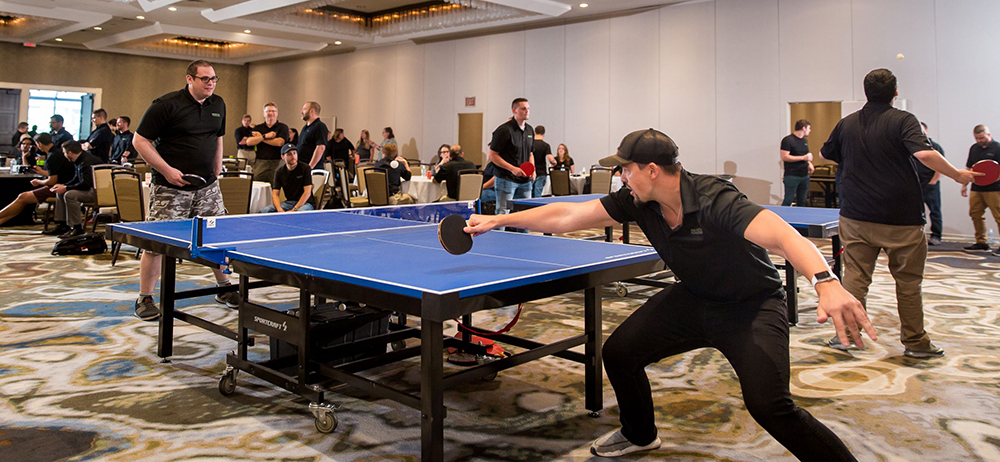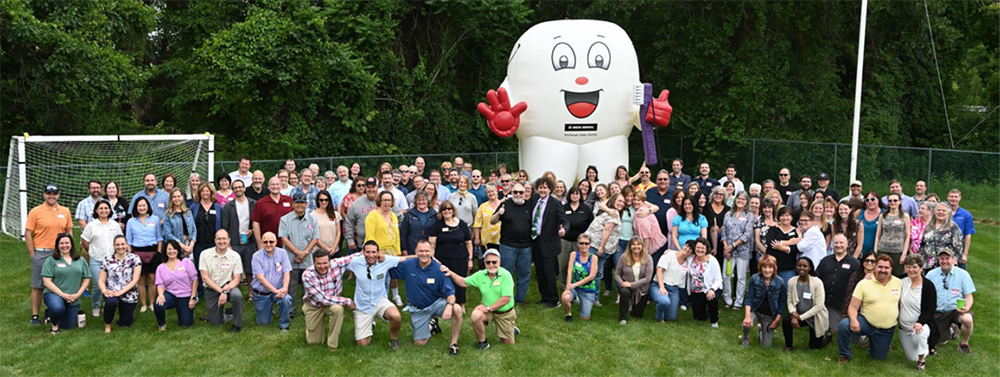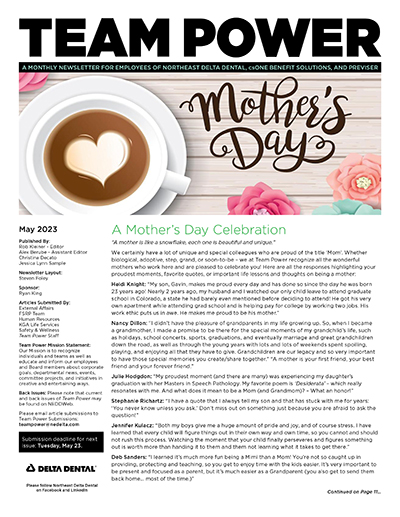 Mainstay Technologies employees play ping pong at a staff event. (Courtesy photo)
Mainstay Technologies employees play ping pong at a staff event. (Courtesy photo)
The COVID-19 emergency may have ended, it had lasting effects on the workplace. Managers struggle to find a balance between providing employees with increased flexibility and remote options, and keeping employees engaged and the company culture vibrant.
Bob Kelleher, president and founder of The Employee Engagement Group, which helps companies with engagement and retention challenges, says his company has seen a sharper focus on employee engagement since the pandemic, particularly around empathy. “We see a very tight labor market right now making the war for talent even tougher,” he says.
“Organizations are having to fight harder to fill positions, which makes retaining current employees even more important. Focusing on the relationship between the employee and their direct manager can be one of the most impactful ways to build engagement and therefore build retention.”
Kelleher says organizations are finding they need to dig deeper when it comes to communicating with employees to better understand the gap between what employees want and need and where the company may be lacking. “They may be having some issues organizationally, such as high turnover, or have gone through a big change and are looking to see how their employees are feeling,” he says. “One of the first steps for us is to conduct an engagement survey.”
Engagement surveys help managers understand not only the “pain points but also what an organization does well,” he says. “From there, we then work with the client to create an action plan on how to best help engage their employees by focusing on three to four items that will make the biggest impact.”
Such communication allows employers to fine tune their culture and benefits offerings to better engage employees rather than just guessing and implementing the latest trends. And it’s not just private sector employers who are taking a deeper dive into their culture to better engage employees. Jennifer Johnston, human resources director for the city of Concord, says one of the biggest issues for the city has been retaining workers. As a result of the pandemic, Concord created a retention and recruitment committee, which led to a remote work policy, she says. “We heard the concerns of our employees through surveys and presented the results last year to the city council,” Johnston says. As a result of employee feedback, the city added a policy that gives department heads authority to allow certain employees to work from home under certain circumstances. The city also now allows new employees to start taking time off the first of the month after they start work, provides referral bonuses to employees who successfully recruit new employees, and makes new employees eligible for benefits after 30 days of working. “On the recruiting side, we’re trying to engage more colleges and high schools in the area and we’re offering sign-on bonuses. We’re also starting people at a higher pay grade, step-four (out of 16 steps),” Johnston says.
Addressing Burnout and Wellbeing
Kelleher says burnout and wellbeing have been a huge concern for almost all his clients. “Globally we have seen engagement go down and we are seeing this with our own clients as well when we review engagement survey results,” he says. “Even our best-in-class clients are seeing drops due to burnout.”
One of the essential strategies to deal with burnout, Kelleher says, is to ensure managers are conducting frequent check-ins with their employees. “This will allow them to identify burnout and adjust workload accordingly,” he says, adding that hybrid and remote work has allowed more employees to have better work-life balance and flexibility. “This also [helps] to alleviate some of the burnout and well-being challenges.”
However, remote work is not the answer for all employees, says Ryan Barton, founder and CEO of Mainstay Technologies, an IT firm with offices in Laconia and Manchester. Barton says having a strong community network is crucial for both an employee’s career advancement and wellbeing. For older employees with families who may have a strong community network, working from home can be positive, he says, because they can “build the recipes for their lives with a lot more flexibility.”
But for newer employees this isn’t always the case, he says, as they may not have strong connections with colleagues or within the community yet or have the skillsets they need to succeed in a remote setting. “I think it can be harder for the younger professionals who might be single, living with roommates or alone; they might not have some of those other important forms of community that more experienced employees [have],” he says, adding that while some people may enjoy working remotely because they don’t have to shower and get dressed and drive to work, it’s not necessarily better for their wellbeing or their career in the long term. “When you don’t have your personal network and your professional skills as developed, advancing can be hard.”
Keeping Remote Employees Engaged
From an organizational perspective, Kelleher says the remote and hybrid work model can be challenging when it comes to a thriving company culture. “As we are seeing, remote work seems to be here to stay and many organizations are embracing it,” he says. “The biggest ways that organizations can make sure their employees are connected and engaged is through increased communication and finding ways to get employees together in person when possible.”
Barton says remote work went from being a “nice benefit that was taken by a few” before COVID to the new normal. “It’s taken shape pretty concretely in that we have a number of staff that have moved to other states, and we have a process for allowing that,” he says.
However, Mainstay doesn’t hire fully remote out-of-state staff. Barton says he has been paying close attention to data and it shows that retaining and engaging staff who start work fully remote is challenging. “Fully integrating people, getting them used to the culture, and getting them to stay requires people to be onsite, at least when they’re starting out,” he says. And Mainstay, Barton continues, brings fully offsite employees back a few times a year for all-staff and big events. “Our whole culture is designed to be hybrid, but we do try to get most of our staff in one day a week.”

Northeast Delta Dental employees participating in an employee appreciation day. (Courtesy photo)
Northeast Delta Dental in Concord has half of its workforce working at its Concord campus or in a hybrid role and half working remotely. Ryan King, human resources director for Northeast Delta Dental, says the dental insurer holds monthly virtual all-colleagues meetings led by CEO Tom Raffio, and individual on-campus meetings to stay engaged and connected with its employees. “We don’t just go through the motions,” he says. “We talk about emotions. We talk about people who have achieved anything educationally, like if they’re completing a degree or finishing a certificate. We talk about anniversaries; we talk about birthdays.”
 Northeast Delta Dental has a monthly publication called Team Power (pictured) put together by employees and King says this has been an important way to keep everyone connected. “There is a lot of fun and interactive stuff in the publication that really helps people to keep in touch with each other. They may not see each other in the office every day, but they see them virtually or they see them in Team Power,” he says.
Northeast Delta Dental has a monthly publication called Team Power (pictured) put together by employees and King says this has been an important way to keep everyone connected. “There is a lot of fun and interactive stuff in the publication that really helps people to keep in touch with each other. They may not see each other in the office every day, but they see them virtually or they see them in Team Power,” he says.
Finding the Right Balance
One of the keys to creating an engaging workplace, Barton says, is to acknowledge the importance of intentional interactions. This can be difficult with remote-only work, he says, adding that the mix of hybrid and remote work seems to work best at Mainstay when people feel connected to others. “We’re always trying to play with [that] balance because you don’t want to require people to be in the office in a way that they end up resenting.”
That includes finding ways to celebrate together, such as game nights and an annual training and celebration day called Mainstay Elevate. Other ways Mainstay maintains a sense of connection is through open listening sessions where staff are allowed to engage senior leadership teams about anything of concern as well as advisory board peer groups.
Given the amount of time people spend working, Barton adds that it’s in everyone’s best interest to provide “places of support and care as opposed to places of alienation where everybody’s just in it for themselves.”
Last June, Northeast Delta Dental brought back its annual colleague appreciation event, which was attended by close to 200 people, King says, explaining it is important that people working remotely don’t feel as though they are isolated at home.
Kelleher encourages clients to embrace flexibility. “Putting overarching policies on things can be limiting,” he says. “Putting guidelines in place that are more flexible can help HR to evolve with the changing times.”

 Current Issue - May 2024
Current Issue - May 2024